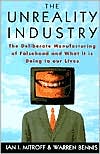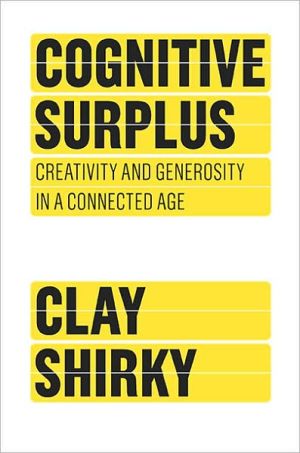The Unreality Industry
The claims made for television when it was a fledgling industry in the early 1950s have virtually all proven false. TV was to be the great entertainer-educator, an electronic marvel that could reach into the lives of millions and, over time, elevate their tastes and sensibilities. As we now know, of course, the entertainment component of this equation has so thoroughly dominated every aspect of TV and the mass media that most everything has been reduced to simple, slick, and powerful images....
Search in google:
The claims made for television when it was a fledgling industry in the early 1950s have virtually all proven false. TV was to be the great entertainer-educator, an electronic marvel that could reach into the lives of millions and, over time, elevate their tastes and sensibilities. As we now know, of course, the entertainment component of this equation has so thoroughly dominated every aspect of TV and the mass media that most everything has been reduced to simple, slick, and powerful images. As Fred Friendly once remarked, "commercial television makes so much money doing its worst, it can't afford to do its best." This is the state of things in America on the eve of the twenty-first century. And as Ian I. Mitroff and Warren Bennis show in this fascinating and profoundly disturbing book, the situation only promises to get worse. Already, newspapers and magazines such as USA Today and Business Week have adopted a sort of television look, helping to blur the line between reality and fantasy that the authors believe is a frightening hallmark of contemporary life. Surveys show that up to 50% of those who watch crime re-enactment programs such as "Rescue 911" believe they are witnessing "the real thing." And consider, for example, the prospect of "virtual reality," where people can place themselves "inside" TV; in the not so distant future, the authors suggest, consenting adults will be able to slip into undergarments lined with sensors and miniature actuators and, while whispering endearments, enjoy "sex" over the phone. What becomes clear as we read The Unreality Industry is that the deliberate creation of unreality is one of the most pivotal social forces shaping our time. Mitroff and Bennis explore in detail the pervasive and dangerous effects of television on American culture, arguing that we have fallen victim to the invented unrealities passed on through the mass media. Focusing on TV as the major culprit of a problem that threatens to spiral out of control, they point to specific issues such as the selection of political candidates, celebrity worship, and the choice by political and business leaders to offer the public pleasing visual images rather than real solutions to a variety of economic and social problems. The authors present a number of suggestions for corrective action, among them an impassioned plea for the uncommercialization of the television news, programs which continue to resemble more and more the satirical "game show" version of the news in the movie Network. The only book to address what is perhaps the most pressing social issue of our time, The Unreality Industry should be required reading for anyone concerned with the extent to which the "American Dream" has become just that. Publishers Weekly A ``collision course with reality'' caused by our inability to grasp the complexities of the post-WW II world has created a fantasy industry designed to provide escape from domestic and global problems, according to this important, hard-hitting study by two professors of business administration at UCLA. This billion-dollar industry, they charge, injects entertainment into every aspect of life, blurring the boundaries between fact and fantasy. Indicting TV as a major villain, Mitroff and Bennis argue that long-range thinking on vital ethical issues has been replaced with repetitious, comforting platitudes that erode society's moral fabric. A need for quick solutions, and a national belief in indefinite material progress, the authors maintain, lead people to confuse bigness with strength, quality for quantity, and celebrity for the leadership that is needed to restore a national vision. (Aug.)
\ Publishers Weekly - Publisher's Weekly\ A ``collision course with reality'' caused by our inability to grasp the complexities of the post-WW II world has created a fantasy industry designed to provide escape from domestic and global problems, according to this important, hard-hitting study by two professors of business administration at UCLA. This billion-dollar industry, they charge, injects entertainment into every aspect of life, blurring the boundaries between fact and fantasy. Indicting TV as a major villain, Mitroff and Bennis argue that long-range thinking on vital ethical issues has been replaced with repetitious, comforting platitudes that erode society's moral fabric. A need for quick solutions, and a national belief in indefinite material progress, the authors maintain, lead people to confuse bigness with strength, quality for quantity, and celebrity for the leadership that is needed to restore a national vision. (Aug.)\ \ \ \ \ Library JournalThis book focuses on how the mass media foster and encourage the state of unreality. Unfortunately, some thought-provoking points are cloaked in sweeping generalizations and unfounded conclusions: ``Television news, like all TV, presents itself in a grossly simplified, if not distorted, way. All issues are stripped down to a few catchword phrases and simplyfying sentences.'' At times, this book suffers from the same malady. Bennis, also author of On Becoming a Leader reviewed in this issue, p. 159.-- Ed. , and Mitroff discuss issues ranging from ``Boundary Warping: Unreality's Primary Mechanism'' to ``The Metaphysics of Sappiness.'' While the authors explore some significant issues in media criticism, they ramble and preach aplenty.-- Jo Cates, Poynter Inst. for Media Studies, St. Petersburg, Fla.\ \








